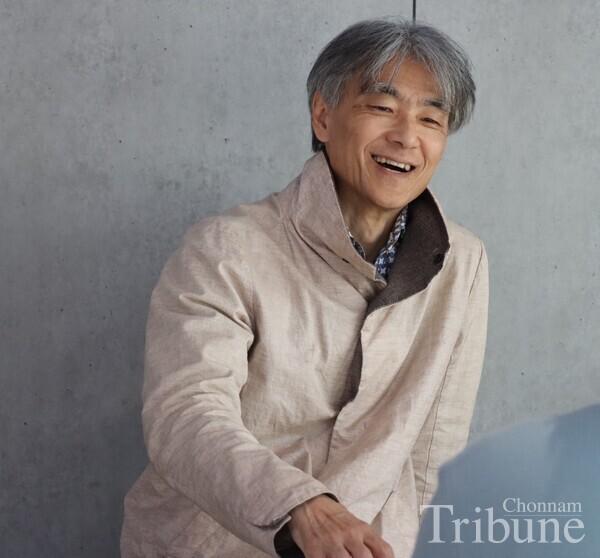On Feb. 27, Professor Emeritus Kim Mun-soo retired from the Department of Psychology at Chonnam National University (CNU). He studied biological psychology, a relatively less-known specialty compared to popular fields such as counseling and educational psychology. Through this interview, the Chonnam Tribune offers readers a chance to understand his career, fascinating insights, and unique perspective. – Ed.

What specifically have you studied within biological psychology? How did you become interested in the field?
My specific field is the neurobiology of memory, with a particular focus on emotional memory. I’ve studied how events are transformed into memories. My journey to becoming a professor of biological psychology began with an interest in the mind-body problem, a philosophical inquiry into the connection between the mind and the body. My major was not philosophy, but I have always been interested in answering philosophical inquiries. I always wanted to know about where the human mind and consciousness come from, and to answer philosophical questions like “How does the brain generate the mind and consciousness.” From that, my interest expanded to seeking scientific evidence to answer my questions, and I went on even further to study human brains.
What is biological psychology, and how is it different from other areas of psychology?
Psychology is the scientific study of the human mind, but since it is impossible to read someone’s mind, psychologists often rely on behavioral data to understand how the mind works. Using this data, they develop concepts and theories about mental processes. Biological psychology explains the mind and behavior through the nervous system. To put it simply, it is a field that focuses on psychological topics using experimental methods derived from biology and neuroscience. It is the interface between social sciences and natural sciences.
You have conducted studies on memory and learning throughout your career. Could you explain what they are?
Our minds and egos are our identities, and memories are the foundation of our identities. Our memories create who we are. If our memories change, our identities change accordingly. The existence of mind and consciousness would be nearly impossible without memory. The mind-body problem is closely related to memory. In the past, experts believed learning occurred in a specific part of the brain. Recent studies, however, have shown that learning actually happens through specialized connections between neurons called “synapses.” When synapses linked to a particular idea become more active, both their synaptic efficacy and the activity of linked neurons in the same circuit changes. This process of change is learning, and its result is memory.
What are the essential elements of memory, and what helps them become long-term memories?
If you reflect on your memories, the most memorable, the strangest, and the most unforgettable memories contain emotions. For instance, if a person experiences an event in an environment filled with fear and pain, that memory is more likely to be remembered for the long haul. Even interest itself counts as a form of emotion. Emotional memory is the strongest type of memory. In conclusion, memories that involve emotions like joy, sadness, or fear more easily become long-term memories.
How can students study more effectively?
Motivation is the most effective learning method. Students need to find joy in their learning materials. They need to have passion for their subject—either because they genuinely like it, or because they will face some serious consequences for not studying. For example, when we try to memorize English vocabulary, certain words are memorized more easily than others. The difference derives from how interesting those words are for you. The most effective way to study is to develop a passion for the material and perhaps even grow to like it. Once that happens, studying becomes far more effective.
How can people improve their brain development?
People believe that studying and memorizing are the best ways to develop the brain, but this is not entirely true. Our nervous system is basically designed for movement, and enabling physical activity is the brain’s most fundamental purpose. However, many Koreans, especially adolescents, sacrifice exercise for studying. Controlling body movement for specific purposes is the core function of the nervous system. A well-balanced life that includes exercise, learning, and the arts can help people develop their brains. Additionally, exercise is the most effective way to prevent dementia. Some people study hard to prevent dementia, but escaping a sedentary lifestyle and combining physical movement with learning are more beneficial to the brain.
You are also interested in stress. What is stress, and how can people manage it effectively?
There is no single scientific definition of stress. It is explained retrospectively. Stress levels depend on how you perceive situations. Something that stressful to you might not affect others. Most stress comes from external environments, and it is more effective to change your surroundings than to try to change yourself. If you want to be free from stress, you need to focus on improving your environment.
With all your experience, what advice would you give students about life?
Globally, the education system gives people grandiose delusions that they must pursue great accomplishments in life. However, not everyone can become great, and they do not need to. We, as humans, are not fundamentally different from other living creatures. I hope students can learn to accept their limits and live a life with minimal stress. We have to work hard enough to support ourselves, but we should abandon greed and live fulfilling lives.
What are your special plans for life after retirement?
After retirement, I have traveled to several places and I am planning to continue exploring. I also try to spend joyful time with my family. Additionally, since I have received so much from society, I want to contribute positively to society, but I am still figuring out ways to make a positive impact in the community.
By Kim Jong-hyo, Editor

